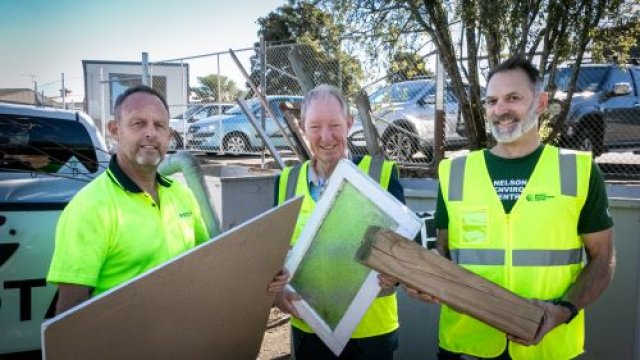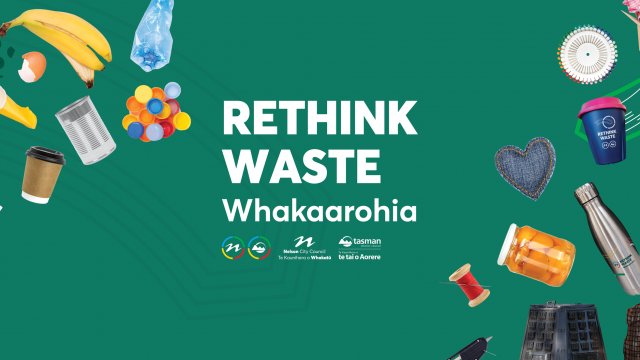Nine projects funded to help reduce waste to landfill
19/05/2022 3:31amNine innovative waste minimisation projects led by Nelson businesses, community groups, and schools will share $42,000 in funding, thanks to Nelson City Council’s Rethink Waste Whakaarohia programme.
The 2022 inagural waste minimisation grant round invited applications across the community to apply for up to $10,000 each to support projects that reduce or avoid waste to landfill.
Group Manager of Infrastructure, Alec Louverdis, is pleased with the high level of interest in the 2022 funding round, and excited by the innovative ideas from businesses and the community that received funding.
“There were a lot of applications, and they were diverse and inspiring, showing that community-led waste minimisation is a force to be reckoned with in our region,” says Alec.
“These projects will give people in Nelson new ways to save money and avoid waste, like the Foodprint app, which helps people buy discounted food from vendors at the end of their business day, or the Stoke Toy Library project creating a rental kit of reusable childrens’ party supplies.”
The applications were assessed against a range of criteria, including how the project delivers on avoiding and reducing waste, how it benefits the Nelson region, and the extent to which it reflects kaupapa Māori.
“Given the high interest and engagement this year, the intention is for Rethink Waste Whakaarohia to repeat these grants on an annual basis, along with a range of smaller grants and activities designed to support waste minimisation in Nelson,” says Alec.
Reducing waste and making better use of resources is a priority at both central and local government levels. The aim is to support a circular economy where waste is designed out and nothing produced becomes rubbish, as part of our transition to a low waste society.
The following projects received grants:

- Foodprint was granted $10,000 to launch their app in our region.
Foodprint enables food vendors to offer end-of-day products to the public for purchase at a discounted rate through their app, thereby reducing food waste and supporting local business.
Foodprint Founder and Director, Michal Garvey, says, “We are very excited to start offering our service in the South Island. Nelson has a vibrant food scene, and many operators from the region have already expressed interest in using Foodprint. We are incredibly grateful to the Nelson City Council for their support in helping to bring Foodprint to the city and their commitment to reducing waste.”

- Recycle A Device (RAD) was granted $7,500 to support the RAD programme in two local schools and colleges. RAD teaches young people how to refurbish used laptops, which are then donated to the community.
Recycle a Device’s General Manager, Bronwyn Scott, says “RAD is excited to begin our programme in Nelson with help from the Council’s Waste Minimisation Grant. We encourage people to think differently about what happens to their laptops at the end of their 'useful' life, teach rangatahi (young people) valuable tech engineering skills to refurbish used laptops, and partner with local community groups to bridge the digital divide by providing whānau with laptops. Making a small change to how people think about e-waste can have a huge impact on shaping pathways and providing opportunities for our rangatahi.”
- Waste No More was granted $7,550 for a feasibility study with the Nelson Market on waste minimisation initiatives.
Carlo Wiegand of Waste No More says, “We are looking forward to working with the Nelson Market on a feasability study to support long term waste minimisation practices. Activities like recycling, composting and reuse will be trialled.”
- Nelson Airport was granted $4,000 to develop a baseline assessment and action plan to reduce waste across all airport activities.
Nelson Airport Airfield and Safety Manager, James Midlewick, says, “We’re constantly looking across our operations at ways to reduce our environmental footprint. The support provided by Nelson City Council through this grant will allow us to contract an independent waste auditor to look at the type and amount of waste we generate. They will provide advice on how we can avoid waste in the first place, as well as reuse or recycle. We will be able to use what we learn to roll out long term effective waste minimisation across the airport.”
- Habitat for Humanity was granted $3,339 for an eight-step platform to improve diversion of construction and demolition waste at their site in Tāhunanui, helping our region to increase options for diverting valuable resources from landfill.
Construction and demolition waste is the second largest source of solid waste in the Nelson Tasman region, after household waste.
- Stoke Toy Library was granted $3,000 to create a comprehensive reusables kit to hire for children’s birthday parties. This simple and practical idea has great potential for replication in other organisations and is a great way to tackle the high volume of single-use waste that parties can create.
- Three schools and colleges were also successful in securing grants to divert food waste through practices such as composting. Council’s Enviroschools programme will be working with the schools to provide support. They are:
- Nayland College - $3,000
- Nelson Intermediate - $2,000
- Nayland Primary - $2,000



